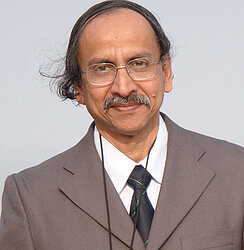Dr. Iddya Karunasagar, India

1. Please describe your (scientific) work/research in a short way.
My work involves improving food safety by understanding foodborne pathogens, their persistence in the environment and developing rapid methods for their detection. My research involved fish associated bacteria like marine Vibrio spp, fish-borne trematodes and pathogens entering the fish value chain through contamination e.g. Salmonella, Listeria monocytogenes, enteric viruses. Understanding the pathogen behaviour in the food chain would help in performing a scientific risk assessment of food safety. My research led me to become a Member of Joint FAO/WHO Expert Meeting on Microbiological Risk Assessment (JEMRA) and I was drafting member for risk assessment of choleragenic Vibrio cholerae O1/O139 in warm water shrimp in international trade. I could also contribute to FAO/WHO risk assessment for Salmonella in fishery products, for histamine and other biogenic amines in fishery products and through these to the Codex standards in fish and fisheries products. My research also focussed on improving fish health through rapid diagnostics, pathogen management using biological control techniques, and improvement of water and sediment quality through use of aquatic probiotic bacteria. These would lead to aquaculture to be sustainable and environment-friendly.
2. Which aspect of a sustainable life, work and research is especially relevant for you and why?
My work on aquatic animal health and food safety would contribute to Sustainable Development Goal 2 Zero hunger, SDG 3 Good Health and wellbeing, SDG 12 Responsible production and consumption. Minimising diseases in aquaculture would be very important to produce seafood sustainably without using antimicrobials thus minimising health risks due to the presence of antimicrobial residues and antimicrobial resistance in aquaculture. Good aquaculture practices are needed to ensure safety of aquaculture products and my research is in these areas. Achieving sustainable increase in aquaculture production would lead to increased food availability, food safety and contribute to zero hunger as well as good health and wellbeing and promote responsible production and consumption.
3. What would be your wish for the future (and why) with this regard?
In future, the events related to climate change would affect sustainability of global food production systems and also food safety. Hence there is a need to intensify research in areas such as sustainability of food systems. In the fisheries sector, the global demand for fish to meet food and nutrition security would increase phenomenally, but water resources are limited and there is a need to find innovative methods to increase food production under conditions of climate change. Factors related to climate change such as increase in sea surface temperature, ocean acidification would lead to conditions that would affect fish health and increase the need for therapeutic options that would not lead to antimicrobial resistance. Climate change is also likely to increase in frequency of harmful algal blooms that impact fish safety. However, innovative technologies involving artificial intelligence could help improve sustainability of food systems.
4. How is the Corona crisis affecting you in your every-day life and work?
Corona crisis has affected everybody's life and work and I am no exception. This has led to all meetings to shift to online mode and personal interactions have been almost impossible for long periods. Researchers have been affected very badly having been unable to go to laboratories, carry out their experiments and field trips had to be canceled. However, there is indication that humanity will learn to adapt to this virus, get vaccinated and follow all covid protocols. There has been a marked shift during this period to digital technologies and it is important for scientists to find innovative solutions to carry out activities in this crisis.



